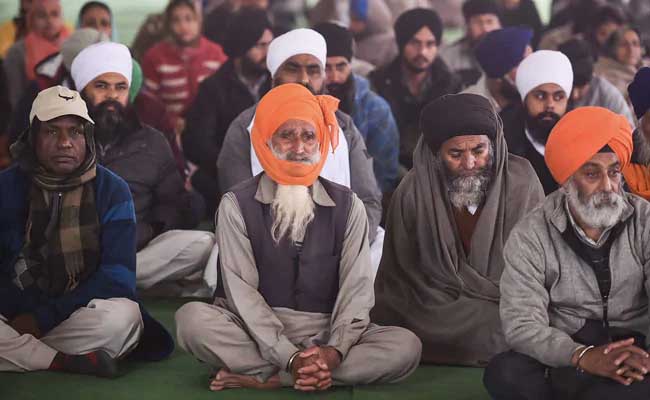
Image courtesy: NDTV
The Supreme Court has issued a notice to farmers’ unions on a plea filed by Delhi Police, to stop the tractor rally proposed on January 26 Republic Day. According to multiple news reports, the Delhi Police, which reports to the Union Ministry of Home Affairs, have in an application said that the rally needs to be “stopped in view of the security arrangements”. The Delhi Police had moved the Supreme Court seeking a ban on the proposed tractor rally, adding that the “Right to protest doesn’t include right to malign the nation.”
This is a rather strange choice of words in a formal petition filed by the police before the highest court of the country. The question arises, can the police allege that a protest is a form of defamation? Moreover, if this contention is allowed, what kind of a precedent does it set?
The Police have told the court that “it has been informed that a small group of protesting individuals/organisations have planned to carry out a tractor rally to disrupt the Republic Day celebrations,” in its application. The Police added that this could cause law and order problems, and thus prove to be “embarrassing for the nation”.
The farmers groups however, are now asking if the “death of 74 farmers in protests against the Farm Laws is not embarrassing for the nation?”
Farmers holding a Tractor March on Jan 26 will be “embarrassing for the nation” as per Delhi Police.
But death of 74 farmers in protests against the Farm Laws is not embarrassing for the nation?#FarmersAppealLawsRepeal#Tractor2Twitter https://t.co/e8NAXyUrHP
— Tractor2ਟਵਿੱਟਰ (@Tractor2twitr) January 12, 2021
During the hearing on Tuesday, before the Supreme Court Bench headed by Chief Justice SA Bobde and comprising Justices A.S Bopanna and V Ramasubramanian, the Chief Justice noted that the court will “say in the order that farmers may apply for permission to the Delhi police commissioner for protests at Ram Lila Maidan or other locations.”
The proceedings were live tweeted from multiple handles over social media, and quoted senior advocate Vikas Singh submitting “that the farmers need a prominent place to protest for visibility. Otherwise, there will be no meaning for the protests”. He had suggested ‘Ram Lila maidan’, which is in the heart of the city, and has been a traditional place for protests, however it is a fenced in open park and has a limited capacity of holding a few thousand people.
Attorney General KK Venugopal had been quoted as saying, there was no question of a “huge group of 1 lakh people entering the city on the Republic Day. We can’t say where all they will go.”
In response the CJI reportedly stated, “It is within your police powers to control that and check if they are armed.”
According to Delhi Police’s plea, “Right to protest is always subject to the countervailing public order and the public interest. The right to protest can never include maligning the nation globally. It is submitted that few days back, the organisations/individuals protesting at various entry points of Delhi have conducted a tractor/trolley march”, and prayed for an injunction restraining “anyone from conducting any protest march either in the form of tractor march, trolley march, vehicle march or any other mode into the National Capital Region territory of Delhi on January 26.” According to news reports, advocate Dushyant Dave, appearing for a few farmers’ unions on Monday, had assured the Court that there would be no such rally.
On Monday, January 11, the Centre had also filed a preliminary affidavit in response to the petition challenging the farmers laws which also mentioned roads that have been blocked by protesting farmers. It also put forth a schedule of the Republic Day parade rehearsal from January 23 onwards and the several ceremonies thereon until January 30, which if interrupted or disrupted in any manner “would not only be against the law and order, public order, public interest but would also be a huge embarrassment for the nation”. This has been stated in the affidavit, clearly, in response to the publicly expressed intention of the many farmers unions to organise a tractor parade during the republic day parade and enter the National Capital Region of Delhi. During Monday’s hearing Attorney General KK Venugopal had also expressed concern regarding the tractor rally.
The Supreme Court has said that it will issue a notice in this regard and hear it on Monday, January 18.
Earlier, in November 2020, the farmers had barely reached the borders of Delhi after braving onslaught of tear gas, water cannons, razor wire, and concrete barricades, and even trenches on the highways that the Police and paramilitary forces were ordered to combat the march. It was after hours of clashes with the protesting farmers at the border areas of Delhi-Haryana-Uttar Pradesh that the police finally allowed the farmers to reach the Singhu border which connects Haryana and Delhi. After the Arvind Kejriwal-led Delhi government refused to allow permission for ‘temporary jails’ being set up in stadiums, the Union Home Ministry had finalised Nirankari Grounds in Burari for farmers’ protest. It was stated that the Nirankari ground can hold around 20 lakh people along with trucks. However, most of the farmers stayed put on the Singhu border. Nearly two months have passed since the first tractors rolled in, and the protest has grown into a revolution, fuelled by support from scores of citizens groups, who run open kitchens, medical camps, information centres, and even libraries for farmers who continue to stream into the city, and stay on, still braving severe cold wave conditions and winter rain.
Related:
Victory for farmers! SC suspends the implementation of three Farm Laws
Centre to SC: Blames Unions, claims farmers happy, mum on absence of consultation
Extremely disappointed with Government’s handling of farmer protests: SC